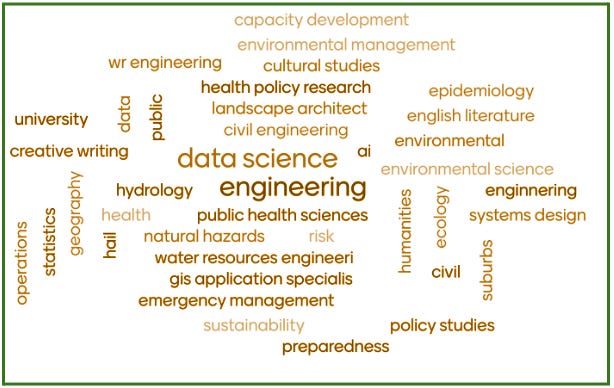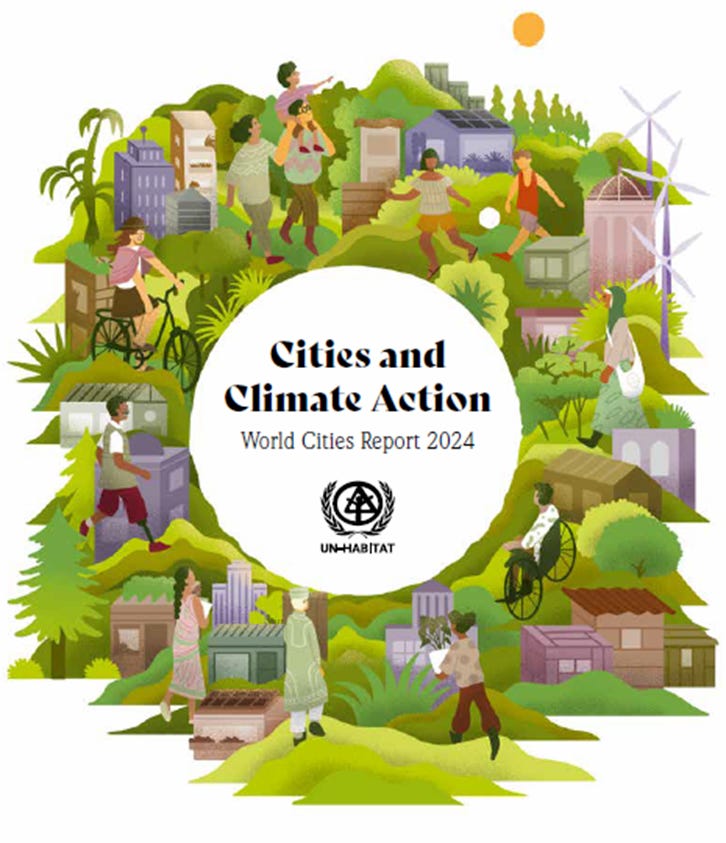Ontario Climate Risk Network Newsletter – First Issue!
Welcome to the Ontario Climate Risk Network Newsletter!
This newsletter is your go-to source for staying informed and engaged with the Ontario Climate Risk Network. Our goal is to foster collaboration by connecting researchers, students, NGOs, and public and private sector stakeholders. Through this platform, we’ll highlight ongoing projects, publications, and breakthroughs while keeping you updated on relevant news, upcoming events, and opportunities.
Subscribe to the OCRW Newsletter here.
The Ontario Climate Risk Workshop
The 2024 Beatrice and Arthur Minden Symposium on the Environment: Ontario Climate Risk Workshop, hosted by the School of the Environment at the University of Toronto in partnership with the Climate Institute at the University of Waterloo, was a landmark event addressing climate risk in Ontario. Held on October 30-31, the workshop brought together researchers, policymakers, industry leaders, and community representatives to share knowledge and shape a research agenda on climate adaptation and resilience.
The activities began with a public-facing plenary featuring speakers from Public Safety Canada, Urban Minds, and other regional organizations, addressing the pressing issues of climate risks and adaptation in Ontario. This was followed by a two-day researchers' meeting, where experts engaged in eight focused sessions covering topics such as Agriculture and Food Systems, Racial Justice, Flooding, Insurance and Financialization of Risk, Urban Heat, Climate Mobilities, Housing, and Emergency Management & Recovery. The sessions identified key resources, barriers, and priorities for future collaboration, which will culminate in a conference proceedings report to guide future research and action.
Explore key insights about the participants through visual wordclouds below.
Participants by sector:
Participants by discipline:
The Ontario Climate Risk Workshop was made possible through the generous support of the Minden Family Foundation, the Toronto Climate Observatory at the University of Toronto and a SSHRC Connections Grant.
Soon: Monthly Seminar Series
We’re excited to introduce a new way to keep our community engaged – a series of monthly seminars starting in the spring. These sessions will provide a space to exchange knowledge, showcase research, and discuss pressing climate risk challenges in Ontario. If you’re interested in sharing your work, whether you’re a researcher, student, or practitioner, we invite you to be a speaker! Reach out to us to express your interest (ontarioclimateriskworkshop@gmail.com).
Network Publications
Explore the latest research and innovations from our network. This month, we’re highlighting:
Dr. Luna Khirfan’s chapter in the UN-Habitat's "Cities and Climate Action: World Cities Report 2024"
Urban green spaces have declined globally, from 19.5% in 1990 to 13.9% in 2020, impacting climate, biodiversity, and public health. Many countries lack climate action plans, and existing ones often prioritize mitigation over adaptation, leaving vulnerable populations at risk. Institutional barriers hinder climate-resilient planning, yet strategies like transit-oriented development support both sustainability and resilience. National policies must integrate mitigation, adaptation, and sectoral strategies. Cities should invest in localized, nature-based solutions—such as green roofs and blue-green infrastructure—ensuring equitable access. A holistic, inclusive urban planning approach is key to building climate resilience and improving quality of life. Read the complete work here.
And more:
Soden, Robert, Taneea S Agrawaal, Austin Lord, Cassandra Chanen, Lillian Flawn, Zeina Seaifan, Michael Classens, and Steve Easterbrook. 2025. “Climate Data Practices: A Research Approach for HCI and Climate Justice”. ACM Transactions on Computer-Human Interaction, February, 3719346. https://doi.org/10.1145/3719346.
Classens, Michael, Kaitlyn Adam, and Sophia Srebot. 2023. “Food Systems Change and the Alternative Campus Foodscape”. Journal of Agriculture, Food Systems, and Community Development 12 (3). Ithaca, NY, USA:155–176. https://doi.org/10.5304/jafscd.2023.123.010.
Kopp, Robert E., Elisabeth A. Gilmore, Rachael L. Shwom, Helen Adams, Carolina Adler, Michael Oppenheimer, Anand Patwardhan, Chris Russill, Daniela N. Schmidt, and Richard York. 2025. “‘Tipping Points’ Confuse and Can Distract from Urgent Climate Action”. Nature Climate Change 15 (1): 29–36. https://doi.org/10.1038/s41558-024-02196-8.
Simpson, Nicholas P., Katharine J. Mach, Mark G.L. Tebboth, Elisabeth A. Gilmore, A.R. Siders, Petra Holden, Brilé Anderson, et al. 2024. “Research Priorities for Climate Mobility”. One Earth 7 (4): 589–607. https://doi.org/10.1016/j.oneear.2024.02.002.
Bakhtiari, Soheil, Mohammad Reza Najafi, Katsuichiro Goda, and Hassan Peerhossaini. 2025. “A Dynamic Bayesian Network Approach to Characterize Multi-Hazard Risks and Resilience in Interconnected Critical Infrastructures”. Reliability Engineering & System Safety 257 (May):110815. https://doi.org/10.1016/j.ress.2025.110815.
Fereshtehpour, Mohammad, Mohammad Reza Najafi, and Alex J. Cannon. 2025. “Characterizing Compound Inland Flooding Mechanisms and Risks in North America Under Climate Change”. Earth’s Future 13 (2): e2024EF005353. https://doi.org/10.1029/2024EF005353.
Crank, Peter J., and Paul Coseo. 2024. “Cityscapes, Climate, and Mental Health: Designing Cities for Thermal Wellbeing”. Journal of Urban Design and Mental Health 9 (1), July. https://doi.org/10.5281/ZENODO.12800033.
Tozer, Laura, Guilherme Baggio, Abhilash Kantamneni, and Hannah MacRae. 2024. “Equity-Based Energy Retrofits to Address Energy Poverty in Canada”. Energy Policy 195 (December):114341. https://doi.org/10.1016/j.enpol.2024.114341.
MacRae, Hannah, and Laura Tozer. 2024. “The Use of Green Bonds in Financing Energy Retrofits in Buildings”. Energy Research & Social Science 112 (June):103500. https://doi.org/10.1016/j.erss.2024.103500.
Have research or insights to share? Submit your work for a chance to be featured in the next issue!
In the News
Canada's disaster funding finally embraces 'build back better'
By Brent Doberstein, Canada’s National Observer
Dr. Doberstein addresses how Canada’s 2025 Disaster Financial Assistance Arrangements (DFAA) overhaul marks a major shift from a reactive disaster recovery model to a proactive approach focused on climate resilience and risk reduction. The updated program allows for investments in climate-resilient infrastructure, pre-disaster mitigation efforts, and support for intangible disaster impacts like mental health trauma. Embracing the “build back better” philosophy, DFAA now funds rebuilding efforts that reduce future vulnerabilities rather than simply restoring pre-disaster conditions. While the changes are a step forward, their success will depend on effective implementation and strong federal-provincial collaboration. See the full article here.
Any news worth sharing with our network? Please, let us know!
Upcoming Events & Opportunities
For researchers:
New Frontiers in Research Fund (NFRF) Transformation Competition is now open!
The objective of the New Frontiers in Research Fund (NFRF) Transformation stream is to support large-scale, Canadian-led interdisciplinary research projects that address a major challenge with the potential to realize real and lasting change. The challenge may be fundamental, leading to a scientific breakthrough, or applied, with a social, economic, environmental or health impact. Projects are expected to be world-leading, drawing on global research expertise, when relevant.
Transformation grants are valued at between $2,000,000 and $4,000,000 per year (including indirect costs) for six years.
Applicants and research administrators are encouraged to attend the Transformation webinars to learn more about the Transformation stream and the overall application process. All the application steps below are mandatory:
Notice of intent to apply deadline: April 15, 2025, 8:00 p.m. (eastern)
Letter of intent to apply deadline: June 17, 2025, 8:00 p.m. (eastern)
Full application deadline: March 3, 2026, 8:00 p.m. (eastern)
For more information about the webinar series and the application process, click here.
For students:
SMART Summer School: Leveraging Data Science, AI, and Cross-Sector Collaboration for Healthy Cities’ Sustainable Ecosystem Innovation
Students can look forward to 5 days packed with interactive workshops, presentations, and a hackathon. Where? McGill University, Montreal, Canada. When? May 26th – May 30th. Applications open from March 3rd until March 31st. Apply here.
SMART Training Platform new course: Modeling the city
This 12-week course covers the drivers and consequences of urban land-use change, the roles/limits of models, an overview of current methodological approaches, and an examination of urban simulation models as used in research contexts. Students will use open-source modelling tools in a hands-on learning environment to gain familiarity with spatial (GIS) modeling approaches, critically assess existing models, and draw practical insights out of model results. Course meetings include 1 hour of asynchronous lecture and 2 hours of synchronous lab/discussion/active learning per week, starting May 5th. For more information, click here.
Engage!
Thank you for being part of the Ontario Climate Risk Network. Together, we can drive meaningful conversations and action on climate risk in our region.
You can contribute to this Newsletter at any time: Content contribution form
If you have any feedback or inquiries, contact us at: ontarioclimateriskworkshop@gmail.com
Stay connected, and see you at our upcoming seminars!
Best regards,
Ontario Climate Risk Network Newsletter Team






